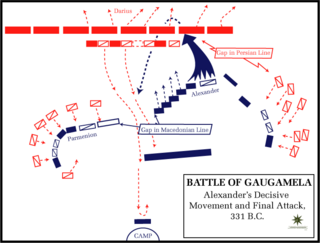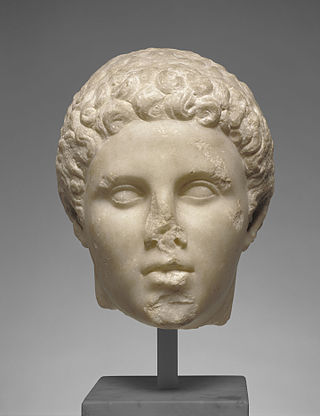The 4th century BCE started the first day of 400 BCE and ended the last day of 301 BCE. It is considered part of the Classical era, epoch, or historical period.

Year 323 BC was a year of the pre-Julian Roman calendar. At the time, it was known as the Year of the Consulship of Longus and Cerretanus. The denomination 323 BC for this year has been used since the early medieval period, when the Anno Domini calendar era became the prevalent method in Europe for naming years.

Demosthenes was a Greek statesman and orator in ancient Athens. His orations constitute a significant expression of contemporary Athenian intellectual prowess and provide insight into the politics and culture of ancient Greece during the 4th century BC. Demosthenes learned rhetoric by studying the speeches of previous great orators. He delivered his first judicial speeches at the age of 20, in which he successfully argued that he should gain from his guardians what was left of his inheritance. For a time, Demosthenes made his living as a professional speechwriter (logographer) and a lawyer, writing speeches for use in private legal suits.
This article concerns the period 339 BC – 330 BC.

This article concerns the period 329 BC – 320 BC.

Year 331 BC was a year of the pre-Julian Roman calendar. At the time, it was known as the Year of the Consulship of Potitus and Marcellus. The denomination 331 BC for this year has been used since the early medieval period, when the Anno Domini calendar era became the prevalent method in Europe for naming years.
Year 330 BC was a year of the pre-Julian Roman calendar. At the time, it was known as the Year of the Consulship of Crassus and Venno. The denomination 330 BC for this year has been used since the early medieval period, when the Anno Domini calendar era became the prevalent method in Europe for naming years.
The denomination 322 BC for this year has been used since the early medieval period, when the Anno Domini calendar era became the prevalent method in Europe for naming years.

Antiochus I Soter was a Macedonian king of the Seleucid Empire. Antiochus succeeded his father Seleucus I Nicator in 281 BC and reigned during a period of instability which he mostly overcame until his death on 2 June 261 BC. He is the last known ruler to be attributed the ancient Mesopotamian title King of the Universe.

Seleucus I Nicator was a Macedonian Greek general, officer and successor of Alexander the Great who went on to found the eponymous Seleucid Empire, led by the Seleucid dynasty. Initially a secondary player in the power struggles following Alexander's death, Seleucus rose to become the total ruler of Asia Minor, Syria, Mesopotamia, and the Iranian plateau, assuming the title of basileus (king). The Seleucid Empire was one of the major powers of the Hellenistic world, until it was overcome by the Roman Republic and Parthian Empire in the late second and early first centuries BC.

Hypereides or Hyperides was an Athenian logographer. He was one of the ten Attic orators included in the "Alexandrian canon" compiled by Aristophanes of Byzantium and Aristarchus of Samothrace in the third century BC.

Hephaestion, son of Amyntor, was an ancient Macedonian nobleman of probable "Attic or Ionian extraction" and a general in the army of Alexander the Great. He was "by far the dearest of all the king's friends; he had been brought up with Alexander and shared all his secrets." This relationship lasted throughout their lives, and was compared, by others as well as themselves, to that of Achilles and Patroclus.

Antipater was a Macedonian general and statesman under the successive kingships of Philip II of Macedon and his son, Alexander the Great. In the wake of the collapse of the Argead house, his son Cassander would eventually come to rule Macedonia as a king in his own right.
Dinarchus or Dinarch was a logographer (speechwriter) in Ancient Greece. He was the last of the ten Attic orators included in the "Alexandrian Canon" compiled by Aristophanes of Byzantium and Aristarchus of Samothrace in the third century BC.

The Lamian War, or the Hellenic War, was an unsuccessful attempt by Athens and a large coalition of Greek states to end the hegemony of Macedonia over Greece just after the death of Alexander the Great. It was the last time Athens played a significant role as an independent power.
Harpalus, son of Machatas, was a Macedonian aristocrat and childhood friend of Alexander the Great in the 4th century BC. Harpalus was repeatedly entrusted with official duties by Alexander and absconded with large sums of money on three occasions. Alexander appointed him treasurer of his empire in Babylon in 330 BC. In 324 BC he fled from Babylon to Athens with a large sum of money. The resulting political controversy in Athens was a contributing factor in the Lamian War.
Lycurgus was a statesman and logographer in Ancient Greece. In the aftermath of the Athenian defeat at the Battle of Chaeronea in 338 BC, he became the leading figure in Athenian politics, taking control of Athenian finances and pushing through a range of measures which drastically increased Athens' revenues. This money was used to expand the navy, improve the city's fortifications, develop the temples and religious ceremonies, and to build up a hefty reserve. He also encouraged the restoration of traditional values and prosecuted those who fell short of his expectations of civic behaviour. Because of his leading role, the period from 338 to 324 BC is often known in modern scholarship as the "Age of Lycurgus."

The Susa weddings were arranged by Alexander the Great in 324 BCE, shortly after he conquered the Achaemenid Empire. In an attempt to wed Greek culture with Persian culture, he and his officers held a large gathering at Susa and took Persian noblewomen in matrimony. The collective weddings involved 80 couples and blended various Greek and Persian traditions. Celebrating his own Persian wife, Alexander intended for these new unions to help him begin identifying himself as a son of Persia and thereby legitimize his claim as the heir of the Persian kings of the Achaemenid dynasty. It was also expected that any children produced from these marriages would, as the progeny of both Greece and Persia, serve as a symbol of the two civilizations coming together under Alexander's Macedonian Empire.
Philippides, son of Philomelos, of Paiania was an Athenian aristocratic oligarch.









